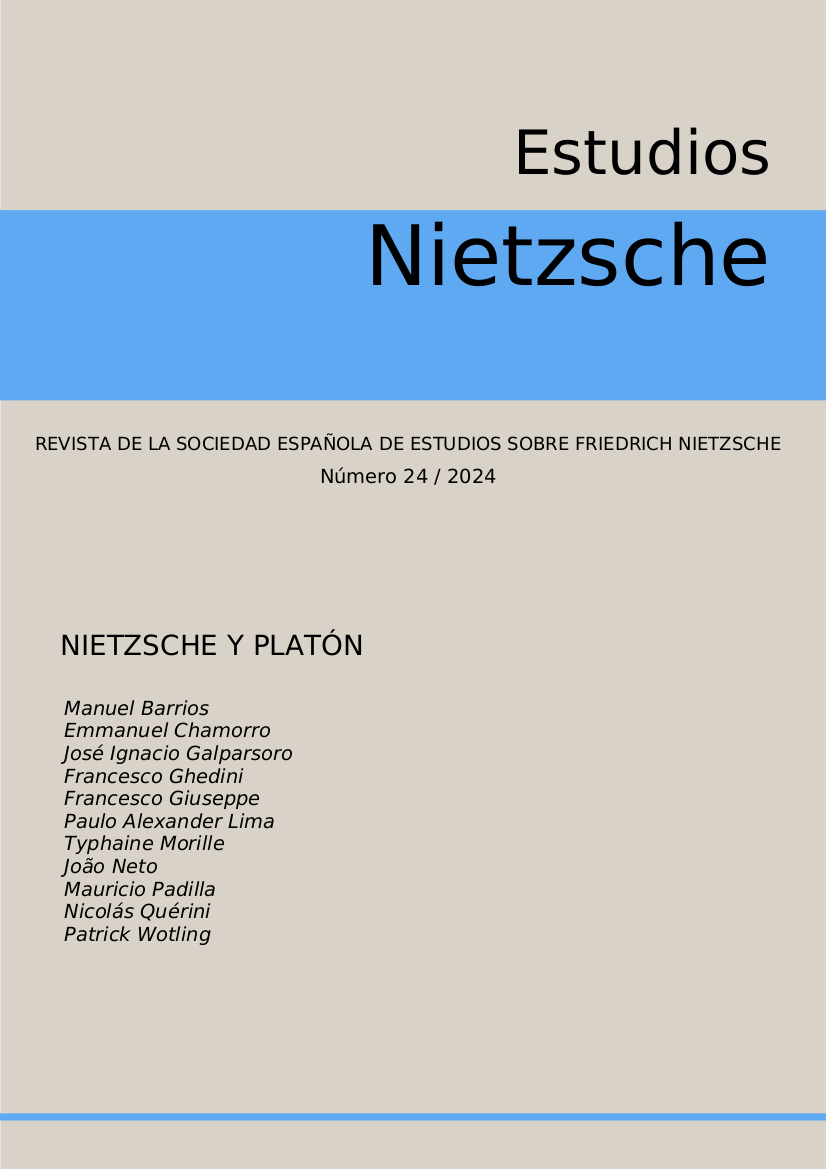The Gay Science. Plato, Nietzsche, and Ortega
DOI:
https://doi.org/10.24310/en.24.2024.18015Keywords:
Nietzsche, Plato, Ortega, playAbstract
Starting from Nietzsche, the theme of "play" assumes a central position in contemporary philosophy. Nietzsche's reflection on play offers, in fact, some starting points for reconsidering Platonic philosophical thought. This recognition has been acknowledged by Ortega y Gasset, whose philosophy of play emerges precisely from the attempt to reconcile Nietzsche's thought with Plato’s philosophy. In this paper, I try to reconstruct this game of symmetries and influences among the three authors, thus attempting to delineate three distinct forms of a gaya ciencia.
Downloads
Metrics
References
Agamben, G., Karman. Breve trattato sull’azione, la colpa e il gesto, Torino: Bollati Boringhieri, 2017.
Aichele, A., Philosophie als Spiel. Platon, Kant, Nietzsche, Berlin: Akademie Verlag, 2000.
Ansell-Pearson, K. and Serini, L., «Friedrich Nietzsche: Cheerful Thinker and Writer. A Contribution to the Debate on Nietzsche’s Cheerfulness», Nietzsche-Studien 51/1 (2022), 1-33.
Arana, J.R., «Nietzsche: de Heráclito al mundo»: Estudios Nietzsche 2 (2011), 13-26.
Blanchot, M., La conversación infinita, trad. de I. Herrera, Madrid: Arena, 2008.
Bremer, D., «Platonisches, Antiplatonisches Aspekte der Platon-Rezeption in Nietzsches Versuch einer Wiederherstellung des frühgriechischen Daseinsverständnisses» Nietzsche-Studien 8/1 (1979), 39-103.
Campioni, G., «“Gaya ciencia” y “gay saber” en la filosofía de Nietzsche”, en Conill, J. y Sánchez Meca, D., Guía comares de Nietzsche, Granada: Comares, 2014, pp. 71-91.
Carchia, G., Retorica de lo sublime, Madrid: Tecnos, 1994.
Colli, G., La sapienza greca. III. Eraclito, Milano: Adelphi, 1993.
Colli, G., Scritti su Nietzsche, Milano: Adelphi, 1980.
Conill Sancho, J., «El sentido deportivo de la vida en la hermenéutica raciovitalista de Ortega y Gasset», Pensamiento: Revista de investigación e información filosófica 75 (286 Extra) (2019), 1061-1078.
Conill Sancho, J., «De la razón pura a la razón vital orteguiana a través de Nietzsche», Revista de Hispanismo Filosófico 21 (2016), 71-92.
D’Alessandro, P., Gioco e filosofia. Come pensare dopo Nietzsche, Milano: UNICOPLI, 1987.
Deleuze, G., Nietzsche et la philosophie, Paris: Presses Universitaires de France, 1962.
Dixsaut, M., Platon-Nietzsche. L'autre maniére de philosopher, Paris: Fayard, 2015.
Fink, E., Nietzsches Philosophie, Stuttgart: Kohlhammer, 1960.
Friedländer, P., Platon [1964], trad. de S. González Escudero, Madrid: Tecnos, 1989.
Ghedini, F., «Il Platone di Nietzsche. Aurora», Rivista di Storia della Filosofia 60/1 (2005), pp. 61-87.
Ghedini, F., Il Platone di Nietzsche. Genesi e motivi di un simbolo controverso, 1864-1879, Napoli: Edizioni scientifiche italiane, 1999.
Ghedini, F., Interrogare la sfinge. Immagini di Platone in Nietzsche (1881-1887), Padova: Il poligrafo, 2011.
Krüger, G., Einsicht und Leidenschaft. Das Wesen des platonischen Denkens, Frankfurt am Main: V. Klostermann, 1963.
Le Moli, A., Platonismo e antiplatonismo da Nietzsche a Derrida, Roma: Carocci, 2018.
Müller, E., «Diálogo crítico de Nietzsche con Platón», Estudios Nietzsche 11 (2011), pp. 67-82.
Nietzsche, F., Correspondencia IV. Enero 1880 – Diciembre 1884, Madrid: Trotta, 2010. Edición dirigida por Luis Enrique de Santiago Guervós. Traducción, introducción, notas y apéndices de Marco Parmeggiani.
Nietzsche, F., Fragmentos Póstumos, ed. dirigida por Diego Sánchez Meca, 4 vols., Madrid: Tecnos, 2006-2010.
Nietzsche, F., Obras Completas, ed. dirigida por Diego Sánchez Meca, 4 vols., Madrid: Tecnos, 2011-2016.
Ortega y Gasset, J., Obras completas, Madrid: Fundación José Ortega y Gasset / Taurus, 10 vols., 2004-2010.
Platón, Diálogos. VIII. Leyes (Libros I-VI), trad. de F. Lisi, Madrid: Gredos, 1999.
Platón, Diálogos. IX. Leyes (Libros I-VI), trad. de F. Lisi, Madrid: Gredos, 1999.
Platón, Platonis opera recognovit brevique adnotatione critica instruxit Ioannes Burnet, Oxford: Oxford University Pressi, 1900.
Trotta, F.G., «Ludendo vivere. Filosofía y juego entre Ortega y Gasset y Huizinga», Revista de Estudios Orteguianos 46 (2023), 85-106.
Downloads
Published
How to Cite
Issue
Section
License
Copyright (c) 2024 Francesco Giuseppe

This work is licensed under a Creative Commons Attribution-NonCommercial-ShareAlike 4.0 International License.
As of issue 21 (2021) this journal is published only in open access (diamond route).
From that number 21, like the previous numbers published in NIETZSCHE STUDIES, they are subject to the Creative Commons Acknowledgment-NoComercia-ShareIgual 4.0 license, the full text of which can be consulted at <http://creativecommons.org/licenses/by-nc-sa/4.0 >
It is the responsibility of the authors to obtain the necessary permissions of the images that are subject to copyright.
This work is licensed under a Creative Commons Attribution-NonCommercial-ShareAlike 4.0 International License.
Copyright generates two different rights: moral rights and patrimonial rights that EJFB recognizes and respects. Moral rights are those relating to the recognition of the authorship. They are rights of a personal nature that are perpetual, inalienable, unseizable and imprescriptible as consequence of the indivisible union of the author and his/her work.
Patrimonial rights are those that can be derived from the reproduction, distribution, adaptation or communication of the work, among others.







11.png)
